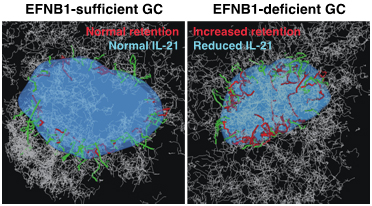Hai Qi’s group from Tsinghua University revealed the novel mechanism in antibody immune response and germinal center regulation
Source:Hai Qi
2017-06-16
On May 19th, 2017, Dr. Hai Qi’s group from the School of Medicine & Institute for Immunology, Tsinghua University, reported in the Science magazine about a new mechanism by which humoral immunity and the germinal center response are regulated (Lu et al., Ephrin-B1-mediated repulsion and signaling control germinal center T-cell territoriality and function. Science, 2017 May 19 356:6339).
The germinal center (GC) response is a process by which long-lived, high-affinity antibodies are generated. Follicular T-helper (Tfh) cells play a crucial role in orchestrating the GC response, and they must function inside the GC tissue microdomain. It is not clear how Tfh recruitment and helper functions are regulated locally. Dr. Qi’s group has found that GC B cells hightly express the Ephrin B1 (EFNB1) molecule, an axon guidance molecule. In the GC, EFNB1 serves as a contact-dependent, repulsive guidance cue that signals through Tfh-expressed EphB6 receptor to inhibit T-B adhesion and GC retention of Tfh cells. Interestingly, EFNB1 also signals through EphB4 and EphB6 to promote IL-21 production from Tfh cells. As a result, EFNB1-null GCs are defective in producing plasma cells despite harboring excessive Tfh cells, whereas in a competitive GC reaction EFNB1-deficient B cells produce more bone-marrow plasma cells as a result of gaining more contact-dependent T cell help. These results reveal a new layer of self-organizing regulatory mechanisms for the GC reaction locally. By uncovering a novel regulatory system that controls GC Tfh dynamics and function, this study may lead to better vaccine design in the future.

Introduction of Professor Hai Qi:
Hai Qi is a Professor in Immunology, at the School of Medicine and Institute for Immunology, Tsinghua University, and also a Principle Investigator at the Tsinghua-Peking Center for Life Sciences. He is a Ministry of Education “Cheung Kong Scholar” (2015), an NSFC “Distinguished Young Scholar” (2014), the Chief Scientist for a “973” program, and “Young Talent in Science and Technology” of Ministry of Science & Technology (2014). Dr. Qi has received numerous awards including the Tan Jiazhen Award for Life Sciences (2015), the CBIS Young Investigator Award (2016) and the Wu Jieping-Paul Janssen Medical &Pharmaceutical Award (2016). In 2017, Dr. Qi is appointed as an International Research Scholar by the Howard Hughes Medical Institute. His group studies immune regulation of antibody responses and tries to understand how the immune system develop and maintain memory of invading pathogens so as to improve vaccines and strategies to treat autoimmune diseases. Dr. Qi has authored 20 primary research papers as first and/or corresponding authors, including four in Nature and two in Science.
The germinal center (GC) response is a process by which long-lived, high-affinity antibodies are generated. Follicular T-helper (Tfh) cells play a crucial role in orchestrating the GC response, and they must function inside the GC tissue microdomain. It is not clear how Tfh recruitment and helper functions are regulated locally. Dr. Qi’s group has found that GC B cells hightly express the Ephrin B1 (EFNB1) molecule, an axon guidance molecule. In the GC, EFNB1 serves as a contact-dependent, repulsive guidance cue that signals through Tfh-expressed EphB6 receptor to inhibit T-B adhesion and GC retention of Tfh cells. Interestingly, EFNB1 also signals through EphB4 and EphB6 to promote IL-21 production from Tfh cells. As a result, EFNB1-null GCs are defective in producing plasma cells despite harboring excessive Tfh cells, whereas in a competitive GC reaction EFNB1-deficient B cells produce more bone-marrow plasma cells as a result of gaining more contact-dependent T cell help. These results reveal a new layer of self-organizing regulatory mechanisms for the GC reaction locally. By uncovering a novel regulatory system that controls GC Tfh dynamics and function, this study may lead to better vaccine design in the future.

Introduction of Professor Hai Qi:
Hai Qi is a Professor in Immunology, at the School of Medicine and Institute for Immunology, Tsinghua University, and also a Principle Investigator at the Tsinghua-Peking Center for Life Sciences. He is a Ministry of Education “Cheung Kong Scholar” (2015), an NSFC “Distinguished Young Scholar” (2014), the Chief Scientist for a “973” program, and “Young Talent in Science and Technology” of Ministry of Science & Technology (2014). Dr. Qi has received numerous awards including the Tan Jiazhen Award for Life Sciences (2015), the CBIS Young Investigator Award (2016) and the Wu Jieping-Paul Janssen Medical &Pharmaceutical Award (2016). In 2017, Dr. Qi is appointed as an International Research Scholar by the Howard Hughes Medical Institute. His group studies immune regulation of antibody responses and tries to understand how the immune system develop and maintain memory of invading pathogens so as to improve vaccines and strategies to treat autoimmune diseases. Dr. Qi has authored 20 primary research papers as first and/or corresponding authors, including four in Nature and two in Science.


